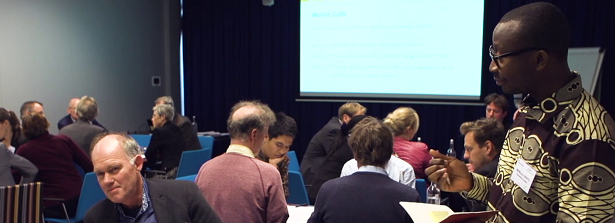Building bridges and joining forces for innovation

“If you want to go fast, go alone. If you want to go far, go together.” With this old Ghanaian saying Worlali Senyo, Director of Growth, Development and Research at Farmerline Ltd in Ghana, opened the session on “Innovation for Food Security”. The saying adequately captured the issue at the heart of the discussions, i.e. that meaningful innovation for food security requires joint efforts and the explicit inclusion of multiple stakeholders and local communities to ensure the widespread uptake of solutions.
Click here for the concept note on this theme, which was developed by researchers from the Global Challenges Programme (GCP) and the Applied Research Fund (ARF) in collaboration with Dutch policy representatives.
A robust, yet low-cost, weather station for cocoa farmers in Ghana; a simple mobile app to optimize water resource management in Bangladesh; and the processing of Ghanaian organic waste into fertilizer and even energy – these are just a small selection of the ARF innovations that are working towards food security in the developing world. While these technological solutions, with all their ingenuity and potential, do seem appealing, Melle Leenstra, policy advisor at the Dutch Ministry of Foreign Affairs, pointed out that when it comes to upscaling – which is crucial for significant impact – problems become apparent. According to Leenstra, the key question for policymakers and researchers is: How do we make sure that the innovative ideas we come up with actually reach those they were designed for?
Spread over three rounds, discussions in this session revolved around three key statements on the connection between development and the uptake of innovations for food security. The first of these statements drew attention to the importance of participatory approaches. While there was no disagreement about the importance of such approaches, questions quickly arose about which stakeholders should be included (not all parties can be involved) and whether participatory approaches are given the credit they deserve by those who ‘hold the money’ (i.e. policymakers). Criteria for innovative projects usually focus on quantifiable outcomes and fail to appreciate the processes involved. Including local communities in the design and dissemination of innovation, building a critical mass of people to ensure the uptake of a new solution, and bringing people together to address a shared problem are activities that have great added value for local communities, even if they do not always result in the tangible ‘results’ they were aiming for.
Central to the second round was the presence of entrepreneurial skills, which was deemed necessary for the uptake of innovation. As small-scale farmers generally lack these skills, investing in entrepreneurship is often seen as a silver bullet for innovation uptake. However, opinions differed on this and it was suggested that it would be sufficient if only a small group of ‘early adopters’ had entrepreneurial skills. Thus, rather than promoting entrepreneurship in everyone, priority should be given to fostering relationships and building networks of people, some of whom are entrepreneurs.
Building networks and relationships also featured in the third round of discussions, although here attention was drawn to a different type of relationship. Policy advisors from the Dutch Ministry of Foreign Affairs, researchers and representatives from the private sector all agreed that sound relationships with domestic politicians are crucial for the development of innovation for food security. However, in practice, the impact of (changes in) political power relations on innovation uptake is often overlooked. Speaking from experience, Rick van der Pas (Koppert BV) pointed out that progress in terms of uptake and development can be seriously hampered by changes in government, as relationships built with politicians over a long period of time can become meaningless when a new regime takes over.
Reflecting on the discussions, it appears that the effective uptake of innovations takes more than attractive technological solutions and entrepreneurship. It requires the building of bridges and sharing of knowledge – in other words, the brokering of knowledge – between innovators and stakeholders, between early adopters and local communities, and between researchers and policymakers. Several practical recommendations were made to achieve these connections, including: 1) projects that develop innovations should collaborate more frequently; 2) civil society and local communities should be more actively engaged in design and dissemination processes; 3) actors other than researchers and policymakers (i.e. private businesses) should be invited to organize dialogues and conferences to ensure that different stakeholders are given a seat at the table; and 4) embassies should be included in the process, as they are a crucial asset in the establishment of relations with stakeholders.
Background information
Watch the interview with Worlali Senyo (Video by The Broker)






The building of relationships and wide ranging networks is core in business. However I have perceived a huge gulf between the local communities on the ground in Africa and their political representatives and I am not sure how this gulf can be narrowed in real concrete terms without loosing local social capital